Why Shiva Accepted Poison but Refused Nectar
Noopur Kumari | Sep 06, 2025, 17:25 IST
Shiva
( Image credit : Times Life Bureau )
When the ocean of milk was churned by gods and demons, both poison and nectar emerged. While the gods fought for nectar, Lord Shiva chose to consume the deadly poison instead. But why would the Mahadev, who could claim immortality, refuse nectar and embrace destruction? The answer lies not in mythology alone, but in timeless wisdom about sacrifice, compassion, and the divine role of Shiva as protector. This story is not just about gods and demons it is a mirror to our own lives, showing why strength sometimes means carrying pain instead of seeking comfort.
Shiva, the eternal Yogi and the destroyer of evil, is often seen as the most mysterious deity of Hinduism. His choices go beyond human logic they are lessons for humanity. One of the most intriguing episodes is from the Samudra Manthan (churning of the cosmic ocean), when poison and nectar came forth. While nectar promised immortality, poison carried death. The gods longed for nectar, but Shiva chose poison. Why? Because true divinity does not seek for itself Iit sacrifices for the world. This is why Shiva is called Neelkantha, the one with the blue throat, the eternal savior of creation.
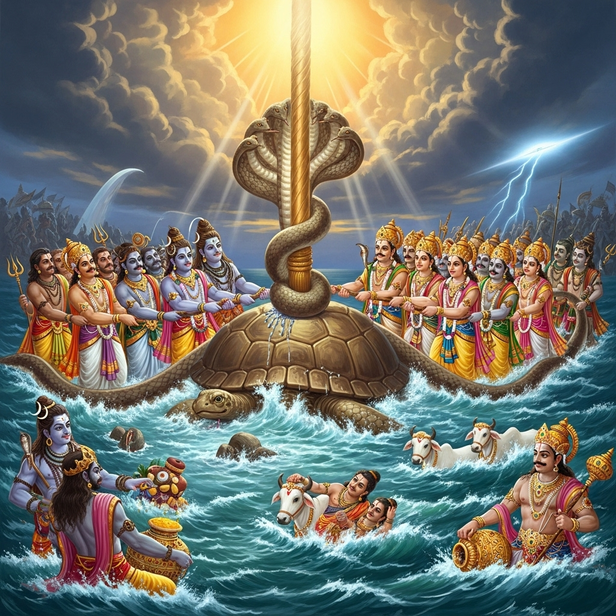
The Samudra Manthan was no ordinary event it symbolized the eternal struggle of life, where good and evil coexist. From the depths of the ocean emerged amrit (nectar), which the devas desired for immortality. But before that came halahala, a deadly poison so powerful that it threatened to destroy all of creation. Both devas and asuras stepped back in fear, unable to face its wrath. And in that moment of crisis, the eyes of the cosmos turned toward Shiva.
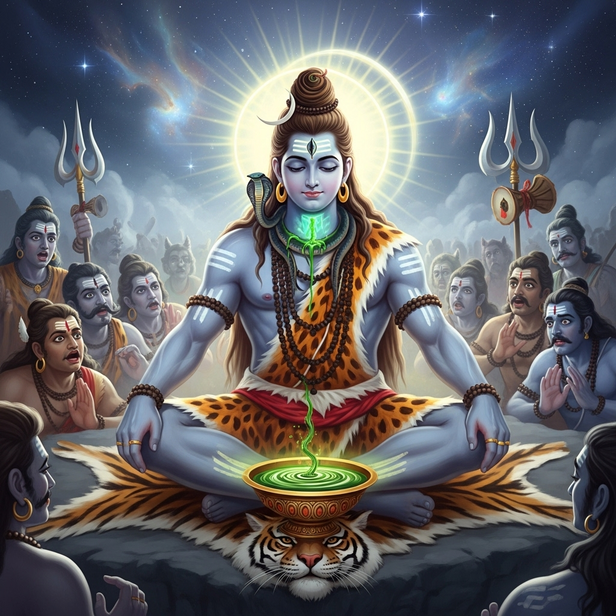
When others craved nectar, Shiva chose the poison. He drank it not for glory, not for power, but to protect existence itself. Holding the poison in his throat, he became Neelkantha. By refusing nectar, he showed that immortality was never his desire for Shiva is beyond life and death. His choice was clear: while the world sought pleasure and survival, he embraced pain to safeguard creation. This act of divine compassion set him apart from every other god.
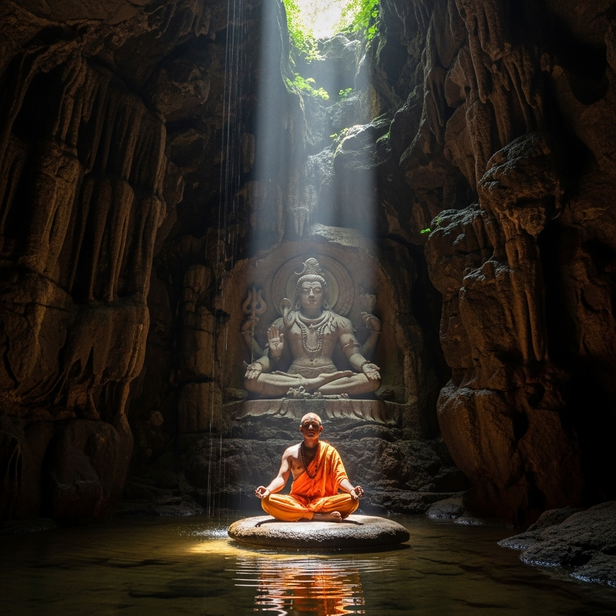
Shiva’s act teaches us that true strength lies not in what we take, but in what we give. While nectar symbolized desire, longevity, and gain, poison symbolized pain, sacrifice, and responsibility. By consuming poison, Shiva showed that a protector’s duty is to absorb suffering, not to escape it. In our own lives, this reflects the sacrifices parents make for children, teachers for students, or leaders for their people. True greatness lies in embracing discomfort for the welfare of others.
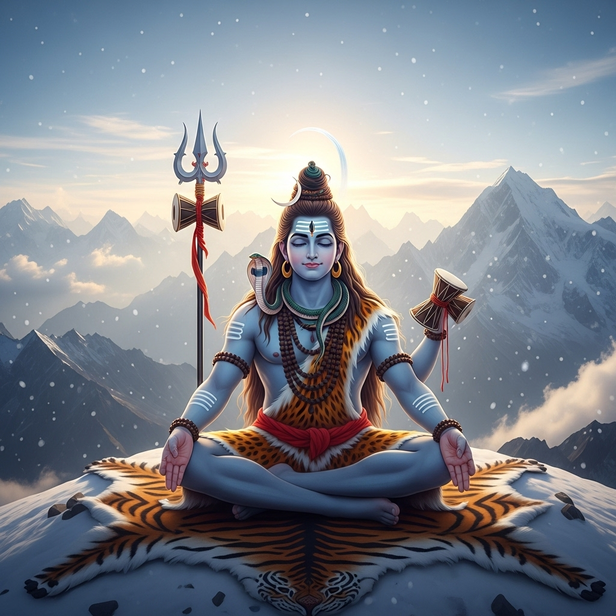
Unlike the gods, who longed for nectar to secure immortality, Shiva had no attachment to life or death. For him, both are illusions. By rejecting nectar, he showed us that divinity doesn’t lie in escaping mortality it lies in transcending it. Nectar is for those who fear death, but Shiva is Mahakaal the one beyond time. His refusal was a reminder that seeking eternal life is meaningless if one cannot rise above desire and fear.
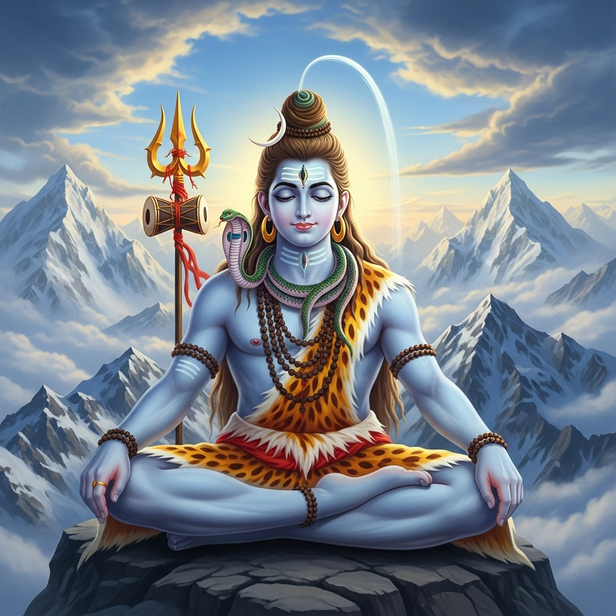
The blue stain on Shiva’s throat is not just a mark of poison it is the eternal reminder of his compassion. He held the poison, not letting it spread within him, teaching us the art of containment and balance. Many of us carry anger, grief, and negativity that poison our hearts. Shiva’s lesson is clear: do not let negativity spread within hold it, contain it, and transform it into strength. His Neelkanth form is a living message of resilience and divine responsibility.
The story of why Shiva accepted poison but refused nectar is more than mythology it is wisdom for every human being. It teaches that life will always present us with nectar (comfort, desire, gain) and poison (pain, sacrifice, hardship). Most will chase nectar, but few will choose poison for the sake of others. Those who do, like Shiva, become eternal remembered not for what they gained, but for what they gave. Sometimes, true divinity lies not in living forever, but in carrying the pain that saves the world.
Explore the latest trends and tips in Health & Fitness, Spiritual, Travel, Life Hacks, Trending, Fashion & Beauty, and Relationships at Times Life!
1. The Cosmic Churning: Nectar and Poison

Samudra Manthan
( Image credit : Times Life Bureau )
The Samudra Manthan was no ordinary event it symbolized the eternal struggle of life, where good and evil coexist. From the depths of the ocean emerged amrit (nectar), which the devas desired for immortality. But before that came halahala, a deadly poison so powerful that it threatened to destroy all of creation. Both devas and asuras stepped back in fear, unable to face its wrath. And in that moment of crisis, the eyes of the cosmos turned toward Shiva.
2. Shiva’s Choice: Poison Over Nectar

Shiva chose the poison
( Image credit : Times Life Bureau )
When others craved nectar, Shiva chose the poison. He drank it not for glory, not for power, but to protect existence itself. Holding the poison in his throat, he became Neelkantha. By refusing nectar, he showed that immortality was never his desire for Shiva is beyond life and death. His choice was clear: while the world sought pleasure and survival, he embraced pain to safeguard creation. This act of divine compassion set him apart from every other god.
3. The Deeper Lesson: Selflessness Over Self-Preservation

SHIV MEDITATION
( Image credit : Times Life Bureau )
Shiva’s act teaches us that true strength lies not in what we take, but in what we give. While nectar symbolized desire, longevity, and gain, poison symbolized pain, sacrifice, and responsibility. By consuming poison, Shiva showed that a protector’s duty is to absorb suffering, not to escape it. In our own lives, this reflects the sacrifices parents make for children, teachers for students, or leaders for their people. True greatness lies in embracing discomfort for the welfare of others.
4. Why Refuse Nectar? The Symbol of Detachment

Shiva
( Image credit : Times Life Bureau )
Unlike the gods, who longed for nectar to secure immortality, Shiva had no attachment to life or death. For him, both are illusions. By rejecting nectar, he showed us that divinity doesn’t lie in escaping mortality it lies in transcending it. Nectar is for those who fear death, but Shiva is Mahakaal the one beyond time. His refusal was a reminder that seeking eternal life is meaningless if one cannot rise above desire and fear.
5. The Eternal Blue Throat: A Symbol of Compassion

Neelkanth Shiv
( Image credit : Times Life Bureau )
The blue stain on Shiva’s throat is not just a mark of poison it is the eternal reminder of his compassion. He held the poison, not letting it spread within him, teaching us the art of containment and balance. Many of us carry anger, grief, and negativity that poison our hearts. Shiva’s lesson is clear: do not let negativity spread within hold it, contain it, and transform it into strength. His Neelkanth form is a living message of resilience and divine responsibility.
Shiva’s Choice, Our Reflection
Explore the latest trends and tips in Health & Fitness, Spiritual, Travel, Life Hacks, Trending, Fashion & Beauty, and Relationships at Times Life!
